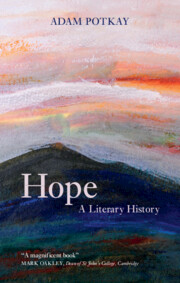'Adam Potkay traces the fascinating, tangled history of hope through the centuries, from classical antiquity to the present day, moving with apparently effortless intellectual grace between literature, philosophy, political thought, and theology. It is a work of great humanity as well as immense but lightly worn erudition, a truly memorable account of this most ambiguous of all the virtues.'
Seamus Perry - University of Oxford
'How hopeless is it to be hopeful? In this magnificent book, Adam Potkay takes us on a literary tour to discover how some have thought hope to be an illusion best avoided, whilst others have believed it to be a virtue that saves souls or effects political change. At a time when hope is spoken of as a positive emotion, but somewhat lacking in substance, this is an important contribution to help clarify whether reality is ultimately trustworthy enough to revitalise the concept for a new generation.'
Mark Oakley - Dean of St John’s College, Cambridge
'Hope: A Literary History is an impressive accomplishment, unusual in its breadth, deeply learned, and engagingly humane in sensibility. Hope is a virtue in common parlance, the optimistic face we turn against a bleak fate. But Potkay traces the origins of this virtue to an equally deeply rooted sense of hope as an irrational flight from reality. These contesting and opposed ideas of hope make for dramatic movements in intellectual history, from the classical and pre-Christian eras through the Enlightenment, Romanticism, and the successive modernisms and post-modernisms of the twentieth century. Potkay’s unique gifts as a historian and reader make him an ideal and genial guide through vast and fascinating cultural territory.'
Nancy Yousef - Rutgers University
'Hope has a history. Potkay traces this history through central literary texts from Greek antiquity to Camus and Beckett, appropriately supported by philosophical, theological and political reflections on hope. Presenting the shifting cases for and against hope with clarity and engagement, he invites his readers to face the challenge of hoping in a world of diverse desires. A great book!'
Werner G. Jeanrond - University of Oslo
‘Hope is seen as ‘an unqualified good’ today, Adam Potkay writes in his excellent history of the idea, … Potkay is a careful reader who makes fine, never forcing texts to say what they don’t, and provides sufficient detail without muddying key distinctions. He shows that as long as there are humans, there will be hope, and that this is both a gift and a curse.’
Micah Mattix
Source: The Spectator
‘A startling achievement.'
Madoc Cairns
Source: Times Literary Supplement
‘… [an] uncommonly insightful exploration of how the world’s literature - from the ancient through the modern - thematizes in enduring works of compelling art the phenomena of hope and, by implication, its ever-present negation, despondency. Potkay adroitly illuminates this familiar, excruciatingly painful dialectic, as old as collective memory itself … Highly recommended.’
H. I. Einsohn
Source: Choice





